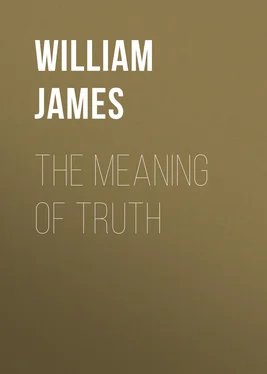William James - The Meaning of Truth
Здесь есть возможность читать онлайн «William James - The Meaning of Truth» — ознакомительный отрывок электронной книги совершенно бесплатно, а после прочтения отрывка купить полную версию. В некоторых случаях можно слушать аудио, скачать через торрент в формате fb2 и присутствует краткое содержание. Жанр: foreign_antique, Философия, foreign_edu, на английском языке. Описание произведения, (предисловие) а так же отзывы посетителей доступны на портале библиотеки ЛибКат.
- Название:The Meaning of Truth
- Автор:
- Жанр:
- Год:неизвестен
- ISBN:нет данных
- Рейтинг книги:3 / 5. Голосов: 1
-
Избранное:Добавить в избранное
- Отзывы:
-
Ваша оценка:
- 60
- 1
- 2
- 3
- 4
- 5
The Meaning of Truth: краткое содержание, описание и аннотация
Предлагаем к чтению аннотацию, описание, краткое содержание или предисловие (зависит от того, что написал сам автор книги «The Meaning of Truth»). Если вы не нашли необходимую информацию о книге — напишите в комментариях, мы постараемся отыскать её.
The Meaning of Truth — читать онлайн ознакомительный отрывок
Ниже представлен текст книги, разбитый по страницам. Система сохранения места последней прочитанной страницы, позволяет с удобством читать онлайн бесплатно книгу «The Meaning of Truth», без необходимости каждый раз заново искать на чём Вы остановились. Поставьте закладку, и сможете в любой момент перейти на страницу, на которой закончили чтение.
Интервал:
Закладка:
Such have been the changes from aristocracy to democracy, from classic to romantic taste, from theistic to pantheistic feeling, from static to evolutionary ways of understanding life—changes of which we all have been spectators. Scholasticism still opposes to such changes the method of confutation by single decisive reasons, showing that the new view involves self-contradiction, or traverses some fundamental principle. This is like stopping a river by planting a stick in the middle of its bed. Round your obstacle flows the water and 'gets there all the same.' In reading some of our opponents, I am not a little reminded of those catholic writers who refute darwinism by telling us that higher species cannot come from lower because minus nequit gignere plus, or that the notion of transformation is absurd, for it implies that species tend to their own destruction, and that would violate the principle that every reality tends to persevere in its own shape. The point of view is too myopic, too tight and close to take in the inductive argument. Wide generalizations in science always meet with these summary refutations in their early days; but they outlive them, and the refutations then sound oddly antiquated and scholastic. I cannot help suspecting that the humanistic theory is going through this kind of would-be refutation at present.
The one condition of understanding humanism is to become inductive-minded oneself, to drop rigorous definitions, and follow lines of least, resistance 'on the whole.' 'In other words,' an opponent might say, 'resolve your intellect into a kind of slush.' 'Even so,' I make reply,—'if you will consent to use no politer word.' For humanism, conceiving the more 'true' as the more 'satisfactory' (Dewey's term), has sincerely to renounce rectilinear arguments and ancient ideals of rigor and finality. It is in just this temper of renunciation, so different from that of pyrrhonistic scepticism, that the spirit of humanism essentially consists. Satisfactoriness has to be measured by a multitude of standards, of which some, for aught we know, may fail in any given case; and what is more satisfactory than any alternative in sight, may to the end be a sum of PLUSES and MINUSES, concerning which we can only trust that by ulterior corrections and improvements a maximum of the one and a minimum of the other may some day be approached. It means a real change of heart, a break with absolutistic hopes, when one takes up this inductive view of the conditions of belief.
As I understand the pragmatist way of seeing things, it owes its being to the break-down which the last fifty years have brought about in the older notions of scientific truth. 'God geometrizes,' it used to be said; and it was believed that Euclid's elements literally reproduced his geometrizing. There is an eternal and unchangeable 'reason'; and its voice was supposed to reverberate in Barbara and Celarent. So also of the 'laws of nature,' physical and chemical, so of natural history classifications—all were supposed to be exact and exclusive duplicates of pre-human archetypes buried in the structure of things, to which the spark of divinity hidden in our intellect enables us to penetrate. The anatomy of the world is logical, and its logic is that of a university professor, it was thought. Up to about 1850 almost every one believed that sciences expressed truths that were exact copies of a definite code of non-human realities. But the enormously rapid multiplication of theories in these latter days has well-nigh upset the notion of any one of them being a more literally objective kind of thing than another. There are so many geometries, so many logics, so many physical and chemical hypotheses, so many classifications, each one of them good for so much and yet not good for everything, that the notion that even the truest formula may be a human device and not a literal transcript has dawned upon us. We hear scientific laws now treated as so much 'conceptual shorthand,' true so far as they are useful but no farther. Our mind has become tolerant of symbol instead of reproduction, of approximation instead of exactness, of plasticity instead of rigor. 'Energetics,' measuring the bare face of sensible phenomena so as to describe in a single formula all their changes of 'level,' is the last word of this scientific humanism, which indeed leaves queries enough outstanding as to the reason for so curious a congruence between the world and the mind, but which at any rate makes our whole notion of scientific truth more flexible and genial than it used to be.
It is to be doubted whether any theorizer to-day, either in mathematics, logic, physics or biology, conceives himself to be literally re-editing processes of nature or thoughts of God. The main forms of our thinking, the separation of subjects from predicates, the negative, hypothetic and disjunctive judgments, are purely human habits. The ether, as Lord Salisbury said, is only a noun for the verb to undulate; and many of our theological ideas are admitted, even by those who call them 'true,' to be humanistic in like degree.
I fancy that these changes in the current notions of truth are what originally gave the impulse to Messrs. Dewey's and Schiller's views. The suspicion is in the air nowadays that the superiority of one of our formulas to another may not consist so much in its literal 'objectivity,' as in subjective qualities like its usefulness, its 'elegance' or its congruity with our residual beliefs. Yielding to these suspicions, and generalizing, we fall into something like the humanistic state of mind. Truth we conceive to mean everywhere, not duplication, but addition; not the constructing of inner copies of already complete realities, but rather the collaborating with realities so as to bring about a clearer result. Obviously this state of mind is at first full of vagueness and ambiguity. 'Collaborating' is a vague term; it must at any rate cover conceptions and logical arrangements. 'Clearer' is vaguer still. Truth must bring clear thoughts, as well as clear the way to action. 'Reality' is the vaguest term of all. The only way to test such a programme at all is to apply it to the various types of truth, in the hope of reaching an account that shall be more precise. Any hypothesis that forces such a review upon one has one great merit, even if in the end it prove invalid: it gets us better acquainted with the total subject. To give the theory plenty of 'rope' and see if it hangs itself eventually is better tactics than to choke it off at the outset by abstract accusations of self-contradiction. I think therefore that a decided effort at sympathetic mental play with humanism is the provisional attitude to be recommended to the reader.
When I find myself playing sympathetically with humanism, something like what follows is what I end by conceiving it to mean.
Experience is a process that continually gives us new material to digest. We handle this intellectually by the mass of beliefs of which we find ourselves already possessed, assimilating, rejecting, or rearranging in different degrees. Some of the apperceiving ideas are recent acquisitions of our own, but most of them are common-sense traditions of the race. There is probably not a common-sense tradition, of all those which we now live by, that was not in the first instance a genuine discovery, an inductive generalization like those more recent ones of the atom, of inertia, of energy, of reflex action, or of fitness to survive The notions of one Time and of one Space as single continuous receptacles; the distinction between thoughts and things, matter and mind between permanent subjects and changing attributes; the conception of classes with sub classes within them; the separation of fortuitous from regularly caused connections; surely all these were once definite conquests made at historic dates by our ancestors in their attempt to get the chaos of their crude individual experiences into a more shareable and manageable shape. They proved of such sovereign use as denkmittel that they are now a part of the very structure of our mind. We cannot play fast and loose with them. No experience can upset them. On the contrary, they apperceive every experience and assign it to its place.
Читать дальшеИнтервал:
Закладка:
Похожие книги на «The Meaning of Truth»
Представляем Вашему вниманию похожие книги на «The Meaning of Truth» списком для выбора. Мы отобрали схожую по названию и смыслу литературу в надежде предоставить читателям больше вариантов отыскать новые, интересные, ещё непрочитанные произведения.
Обсуждение, отзывы о книге «The Meaning of Truth» и просто собственные мнения читателей. Оставьте ваши комментарии, напишите, что Вы думаете о произведении, его смысле или главных героях. Укажите что конкретно понравилось, а что нет, и почему Вы так считаете.












